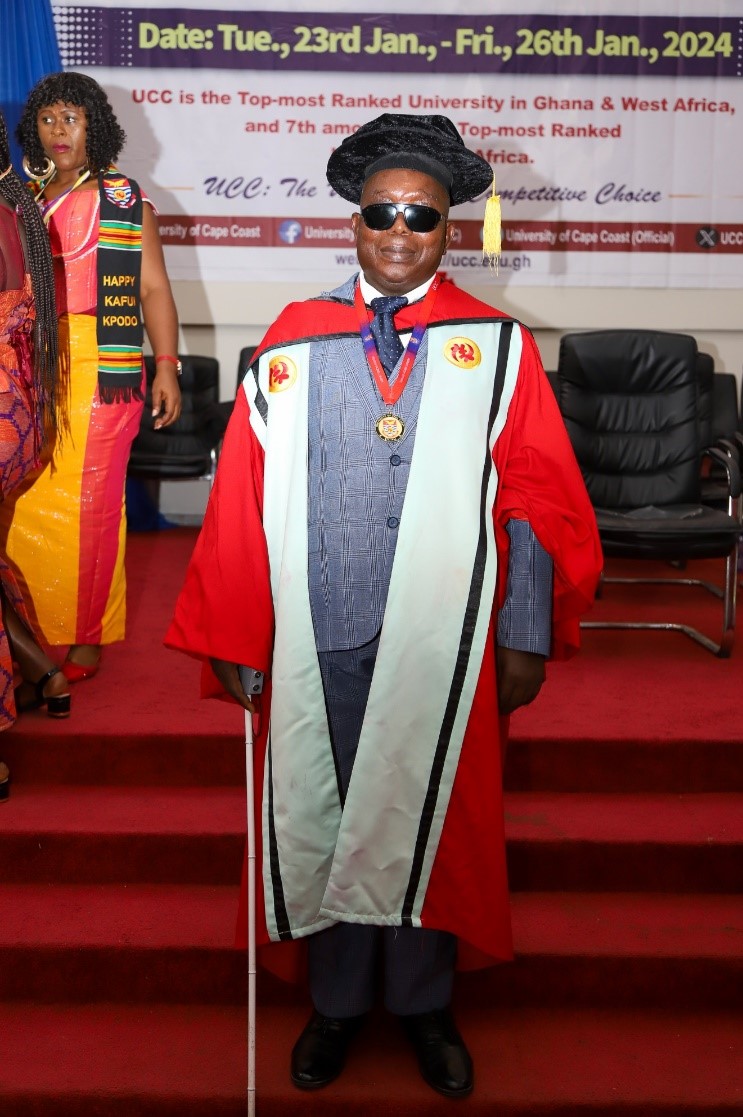Among the graduates from the University of Cape Coast (UCC) at its 7th Session of the 56th congregation was Dr. Ben Bishop Nyanihorba Ayamba, the first visually impaired PhD graduate from UCC.
Dr Ayamba, a native of Pusiga in the Upper East Region graduated with a PhD in Guidance and Counseling.
In recognition of this feat, he received US $2, 000 award from the Chancellor of the University, Dr. Sir Sam Jonah.
In an interview, Dr Ayamba, told the media that he lost his sight in an accident in August 1995.
Dr Ben Bishop Nyanihorba Ayamba in a handshake with Sir Sam Jonah. Looking on are Prof. Johnson Nyarko Boampong, Vice-Chancellor, and Prof. Rosemond Boohene, Pro Vice-Chancellor.
Owing to his condition, he enrolled at the Presbyterian Training College, Akropong to study braille.
Following the rehabilitation at the School of the Blind at Akropong, Dr Ben Bishop Nyanihorba Ayamba said he pursued further education at UCC after completing his Teachers Training College in 1999.
He was subsequently assigned to teach at the Junior High School at Ntonso for two years before enrolling at UCC in 2001 for his bachelor’s degree. He completed in 2004 with a Bachelor of Education in English and Psychology.
Following this, he was posted to Mampong Technical College of Education to teach English.
After three years of teaching, he returned to UCC to pursue his Master of Philosophy in Guidance and Counseling.
In 2016, he gained admission to read PhD in Guidance and Counseling at UCC.
Dr Ayamba stated that his journey was marked by prayers and determination and advised parents of children with disabilities to prioritise their wards education, noting the availability of numerous disability schools in Ghana.
Seek support
He urged persons with disability to contact the Department of Social Welfare, Ghana Blind Union, and other organisations that support the physically challenged and PWDs for direction and support.
Dr Ben Bishop Nyanihorba Ayamba with some relatives after the ceremony
Dr Ayamba suggested that parents of children with disabilities should send them to rehabilitation and examination centres to assess their capabilities and determine suitable educational settings whether inclusive, mainstream, or special schools.
He believed that such efforts would help individuals with disabilities recognise their potentials, pursue their interests, and contribute meaningfully to their families, communities, nation, and the world at large.
Dr Ayamba acknowledged the challenges he faced on his journey but credited his achievements to prayers and determination.
He also expressed gratitude to the University of Cape Coast for providing a comfortable and accessible environment for his studies.
Source: Daily Graphic



